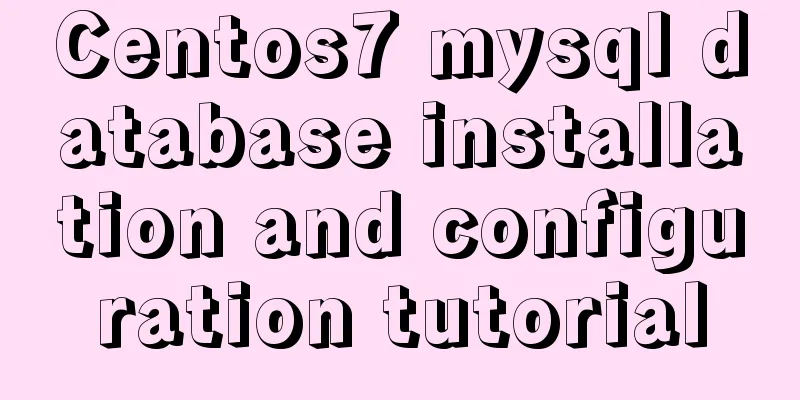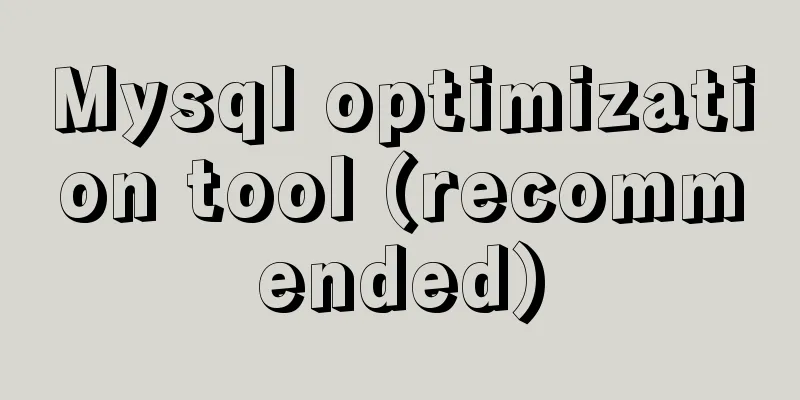Centos7 mysql database installation and configuration tutorial

|
1. System environment The system version after yum update upgrade is
2. MySQL installation Generally, the information provided on the Internet is
The installation of mysql and mysql-devel was successful, but the installation of mysql-server failed, as follows: [root@yl-web yl]# yum install mysql-server Loaded plugins: fastestmirror Loading mirror speeds from cached hostfile * base: mirrors.sina.cn * extras: mirrors.sina.cn * updates: mirrors.sina.cn No package mysql-server available. Error: Nothing to do After checking the information, I found that the CentOS 7 version removed the MySQL database software from the default program list and replaced it with mariadb. There are two solutions: 1. Method 1: Install mariadb MariaDB database management system is a branch of MySQL, mainly maintained by the open source community and licensed under the GPL. One of the reasons for developing this branch is that after Oracle acquired MySQL, there was a potential risk of closing the source of MySQL, so the community adopted the branch method to avoid this risk. MariaDB aims to be fully compatible with MySQL, including API and command line, making it an easy replacement for MySQL. Install mariadb, size 59 M. [root@yl-web yl]# yum install mariadb-server mariadb The relevant commands for the mariadb database are:
So start the database first [root@yl-web yl]# systemctl start mariadb Then you can use mysql normally [root@yl-web yl]# mysql -u root -p Enter password: Welcome to the MariaDB monitor. Commands end with ; or \g. Your MariaDB connection id is 3 Server version: 5.5.41-MariaDB MariaDB Server Copyright (c) 2000, 2014, Oracle, MariaDB Corporation Ab and others. Type 'help;' or '\h' for help. Type '\c' to clear the current input statement. MariaDB [(none)]> show databases; +--------------------+ | Database | +--------------------+ | information_schema | |mysql | | performance_schema | | test | +--------------------+ 4 rows in set (0.00 sec) MariaDB [(none)]> After installing mariadb, MariaDB [(none)]> is also displayed, which may look a bit strange. Here is the second method. 2. Method 2: Download and install mysql-server from the official website
After successful installation, restart the mysql service. # service mysqld restart When installing MySQL for the first time, the root account has no password. [root@yl-web yl]# mysql -u root Welcome to the MySQL monitor. Commands end with ; or \g. Your MySQL connection id is 3 Server version: 5.6.26 MySQL Community Server (GPL) Copyright (c) 2000, 2015, Oracle and/or its affiliates. All rights reserved. Oracle is a registered trademark of Oracle Corporation and/or its affiliates. Other names may be trademarks of their respective owners. Type 'help;' or '\h' for help. Type '\c' to clear the current input statement. mysql> show databases; +--------------------+ | Database | +--------------------+ | information_schema | |mysql | | performance_schema | | test | +--------------------+ 4 rows in set (0.01 sec) mysql> Set password mysql> set password for 'root'@'localhost' =password('password'); Query OK, 0 rows affected (0.00 sec)mysql> No need to restart the database to take effect. The following are the contents during the MySQL installation process: Installed: mysql-community-client.x86_64 0:5.6.26-2.el7 mysql-community-devel.x86_64 0:5.6.26-2.el7 mysql-community-libs.x86_64 0:5.6.26-2.el7 mysql-community-server.x86_64 0:5.6.26-2.el7 Dependency Installed: mysql-community-common.x86_64 0:5.6.26-2.el7 Replaced: mariadb.x86_64 1:5.5.41-2.el7_0 mariadb-devel.x86_64 1:5.5.41-2.el7_0 mariadb-libs.x86_64 1:5.5.41-2.el7_0 mariadb-server.x86_64 1:5.5.41-2.el7_0 So after installation, mariadb is automatically replaced and will no longer take effect. [root@yl-web yl]# rpm -qa |grep mariadb[root@yl-web yl]# 3. Configure MySQL 1. Coding The mysql configuration file is /etc/my.cnf Finally add the encoding configuration [mysql]default-character-set =utf8 The character encoding here must be consistent with that in /usr/share/mysql/charsets/Index.xml.
2. Remote connection settings Assign all permissions on all tables in all databases to the root user at all IP addresses. mysql> grant all privileges on *.* to root@'%' identified by 'password'; If it is a new user instead of root, you need to create a new user first mysql>create user 'username'@'%' identified by 'password'; Now you can connect remotely. The above is the full content of this article. I hope it will be helpful for everyone’s study. I also hope that everyone will support 123WORDPRESS.COM. You may also be interested in:
|
<<: Vue implements file upload and download functions
>>: Detailed example of MySQL subquery
Recommend
Detailed explanation of the problem that the space is not released after the Linux file is deleted
Preface When the system space usage is too large ...
Detailed steps to install MySQL on CentOS 7
In CentOS7, when we install MySQL, MariaDB will b...
Pure CSS allows child elements to break through the width limit of parent elements
In writing styles, we can often see this situatio...
Detailed example of Linux all-round system monitoring tool dstat
All-round system monitoring tool dstat dstat is a...
Detailed explanation of the solution to the problem that the content pointed to by the iframe's src does not refresh
Problem Description html <iframe id="h5Co...
JavaScript to implement a simple web calculator
background Since I was assigned to a new project ...
CSS3 timeline animation
Achieve results html <h2>CSS3 Timeline</...
JavaScript to achieve text expansion and collapse effect
The implementation of expanding and collapsing li...
Introduction to major browsers and their kernels
Trident core: IE, MaxThon, TT, The World, 360, So...
How to implement controllable dotted line with CSS
Preface Using css to generate dotted lines is a p...
Optimized record of using IN data volume in Mysql
The MySQL version number is 5.7.28. Table A has 3...
JS asynchronous code unit testing magic Promise
Table of contents Preface Promise chaining MDN Er...
my.cnf parameter configuration to optimize InnoDB engine performance
I have read countless my.cnf configurations on th...
HTML version declaration DOCTYPE tag
When we open the source code of a regular website...
Use of Linux network configuration tools
This article introduces RHEL8 network services an...










